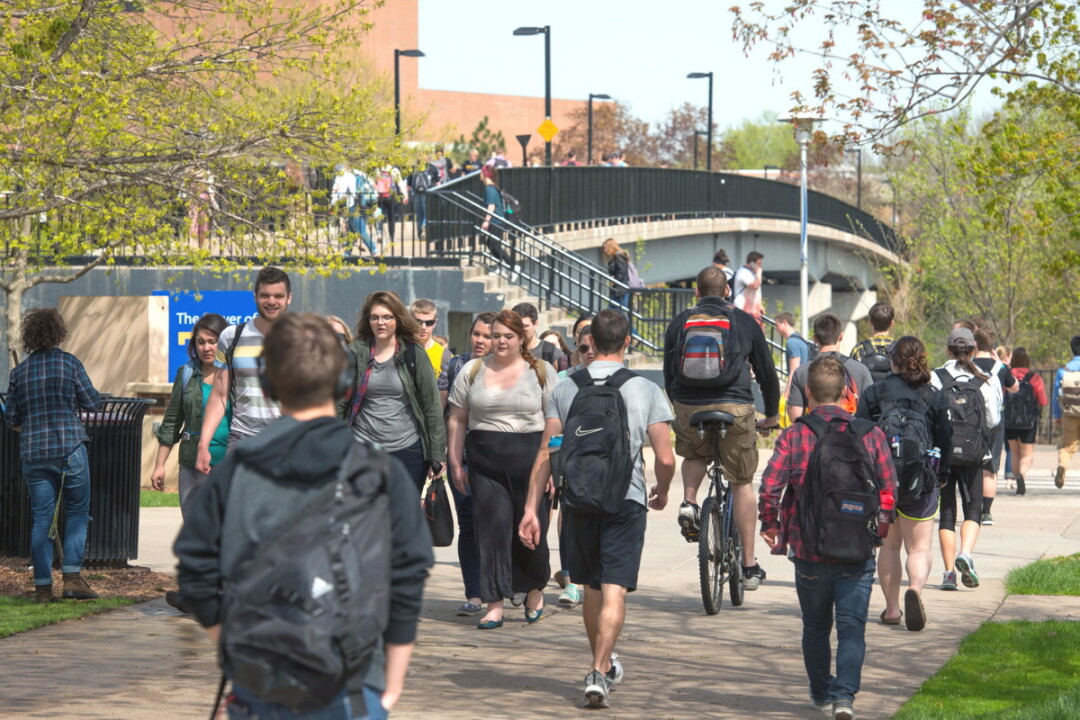A Wise Investment in Wisconsin Businesses
cuts to UW System will come back to bite local job creators

"One hundred years ago the chamber rented a rail car to go down to Madison,” President Bob McCoy of the Eau Claire Area Chamber of Commerce told the gathering of business leaders. A century ago, chamber members traveled to Madison to advocate for a new University of Wisconsin campus in Eau Claire.
“Maybe next time we’ll have to take a high speed train,” he joked.
“The Eau Claire difference is the engagement of our students and faculty,” UW-Eau Claire Chancellor Jim Schmidt noted. Nearly half of undergraduate students engage in research. This research can have a direct impact and positive benefit on our community.
Recently, I attended a Chamber of Commerce event at which UW- Eau Claire Chancellor Jim Schmidt spoke to members about the university and its relationship with the community. The entire Chippewa Valley benefits from “the amazing culture of service in our Eau Claire businesses,” Schmidt said. “This is our culture at UWEC.”
“The Eau Claire difference is the engagement of our students and faculty,” Schmidt noted. Nearly half of undergraduate students engage in research. This research can have a direct impact and positive benefit on our community.
Through many conversations and visits with faculty and students, I learned about the amazing research happening at UWEC and the direct benefits to Chippewa Valley businesses. I learned about the invention of new materials for manufacturing, advances in physical therapy, research in nursing, and students studying air and water quality near sand mines – just to name a few projects.
From molecules to the makeup of the earth, students learn by doing. Faculty work closely with students to help frame research questions, making relevance to real-world challenges an important aspect of inquiry.
All the interactions among business leaders, students, and faculty take time. Developing relationships to create real-world student experiences is difficult to quantify. In this age of accountability, university professors have come under fire. The heated political rhetoric does not improve morale and – in the end – hurts all of us.
The chancellor has been touring businesses in the Chippewa Valley. He met with more than 70 business leaders and wove what he learned into his presentation to chamber members. “I stand proudly to support liberal arts,” he told business leaders. “Close to 70 percent of the CEOs I asked came from the liberal arts and humanities.”
In response to the budget cuts, the chancellor led efforts with the entire campus staff to undergo eight major initiatives to reorganize how the campus does business.
Under Gov. Scott Walker’s direction, last year majority legislators cut $250 million from the base UW System’s 2015-17 budget. In addition, they did not fund another $100 million in building maintenance, which normally passes as part of the state’s borrowing budget. “This is kicking the can down the road,” the chancellor told me in a follow-up interview. “Penny wise and pound foolish. Look at the roads. It’s the same with the university buildings. The buildings, like the roads, need to be maintained.”
Budget cuts and low faculty salaries (compared to peer institutions) mean faculty retention and recruitment is difficult. For example, this year the university lost 25 faculty – an increase of 150 percent over last year (also a high year for faculty loss).
Business leaders expressed concern about the loss of faculty in accounting and economics. Graduates of these two program are highly sought by business leaders. “Accounting is the single most expensive professor, and River Falls just took one of ours and paid him more,” Schmidt told the chamber members.
“What keeps you from expanding your business? We don’t have confidence we can find employees,” said the chancellor in response to a question about a recent report on jobs. “We want to educate more people but we can’t do this if we don’t have the money.”
He told business leaders the conversations would continue. “I won’t be asking you to help Jim,” Schmidt said. “I’ll be asking what to do to help you and your business … to improve the vitality of our region.”
McCoy closed the address by telling those gathered, “Our fear is the future, what are we creating for the next generation?”
Whatever the future holds, we know the next generation of business leaders will need to be smarter and work synergistically with our university students and faculty. The return on investments we make today will be the success of our next generation.
Vinehout, D-Alma, has represented the 31st District in the state Senate since 2007. The district includes all or part of seven counties, include most of the city of Eau Claire.


















